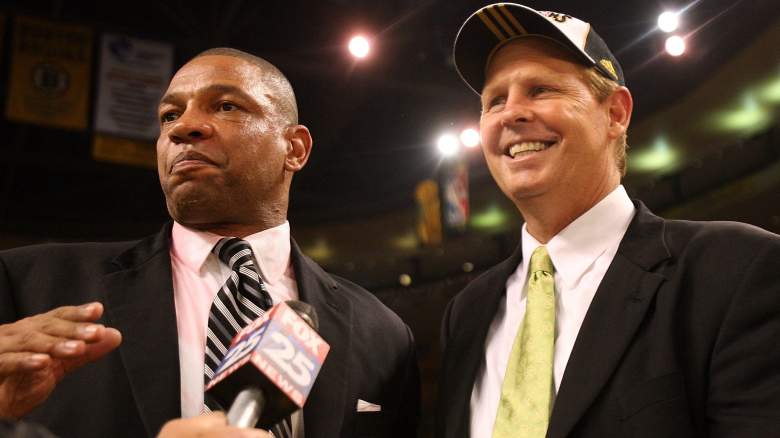
Getty Danny Ainge, right, of the Celtics, with coach Doc Rivers
During his 18 years running the Celtics, team president Danny Ainge gained a reputation for being both active on the trade market—some call him Trader Danny—and trenchant in his approach. The Celtics are known to take tough positions around the NBA on players and deals while, at the same time, have a reputation for allowing reporters to think the team was close to a trade even if it did not come to fruition.
But how true is Ainge’s reputation around the league? Celtics Blog’s Keith Smith approached 16 front-office executives to take their temperature on what it is like to deal with Ainge and the Celtics.
While most were complimentary of Ainge and his well-respected assistant GM and team counsel, Mike Zarren, a graduate of Harvard Law School and an expert on the salary cap, the quote that probably best sums up how Ainge is viewed is this one:
“I hate talking trades with Danny because I feel like I’m gonna lose on something,” as one Eastern Conference general manager put it.
‘They Don’t Mess Around’
Ainge, of course, has been around for nearly two decades and in order to achieve that level of longevity, you have to have done some things right—otherwise, you get fired. But because Ainge has such job security, he arouses suspicion in his colleagues.
As the East GM told Smith, “One time, he called me about a guy who wasn’t in our rotation. This guy had played like five games in two months. I immediately panicked and called my team and our scouts and asked them ‘What are we missing? Why does Boston want him?’. That’s the sort of stuff you second-guess when talking trades with Danny.”
Ainge joined the Celtics’ front office in 2002, as the team had emerged from a lost decade in the 1990s. The Celtics muddled through the first three years of his time in Boston, but had a breakthrough in 2007 when they traded the No. 4 pick in the draft for Seattle star Ray Allen. Pairing Allen with Paul Pierce proved to be enough of a lure to get Kevin Garnett to OK a trade to Boston from Minnesota.
The Celtics went on to win the 2008 NBA title and reach the 2010 NBA Finals.
Ainge, it turns out, can also be pretty blunt.
“They don’t mess around,” one Western Conference exec told Smith. “You ask about a guy and they don’t want to talk about him, they’ll tell you right away that you are wasting your time. Danny and Mike are also up front if you call and they don’t want anything from your roster. Once, at the draft, they told us ‘You better be talking picks, because we don’t want any of your players’.”
Ouch.
Not All Goes Danny Ainge’s Way
Ainge did take some criticism last offseason for the handling of the Gordon Hayward situation, in which it was said that the Pacers were willing to give up center Myles Turner and shooter Doug McDermott in a sign-and-trade deal. The Celtics wanted Victor Oladipo or T.J. Warren in the deal.
The trade wound up collapsing and Hayward went to Charlotte, with the Celtics getting only a traded-player exception in return.
An Eastern Conference executive told Smith: “We’ve walked away from deals with Boston because they push too hard for an extra piece. Sometimes it’s a player, sometimes it’s a pick.”
And that can hurt the Celtics. Ainge had a mass of picks in the last few years—seven in the last three drafts—and had opportunities to upgrade the team’s depth by dealing away some picks but failed to do so. Instead, he has a team deep in youth and inexperience that often lacked veteran leadership in the postseason.
“More recently, they had to have chances to move picks for players, but didn’t,” a Western Conference GM told Smith. “Now what do they have? Young players blocked on the roster and they used good picks to dump salary. Those are misses.”
READ NEXT: Celtics Should Target Trade for Veteran Guard, Analyst Suggests
